Sep 9, 2025 – European Lecture Tour (2) Paris, Dharma Q&A with French Interpretation
Hello. Today is the second lecture of Venerable Pomnyun Sunim’s European tour, held in Paris, France.
Sunim woke up at 3 a.m. for practice and meditation. After expressing gratitude to Jungto Society member Kim Nuri and her husband for providing accommodation and meals, Sunim left the lodging at 4 a.m. and headed to the train station.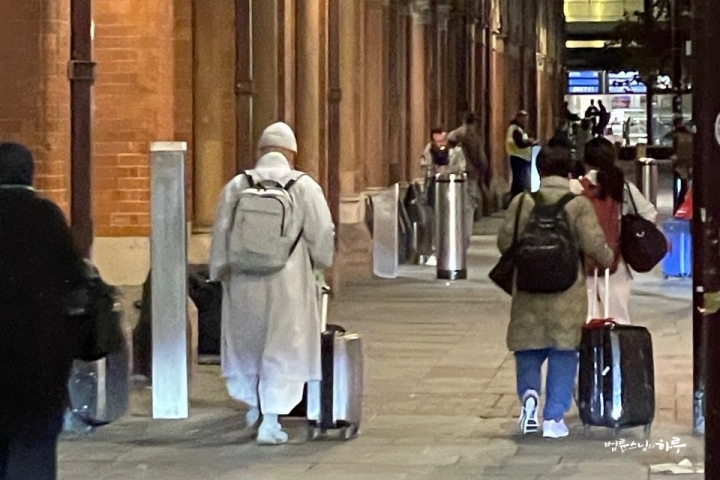
Thinking they had arrived first, they found many people already waiting in line. At 4:40 a.m., UK departure procedures, French entry procedures, and baggage inspection began. The system was identical to that of an airport.
At 6 a.m., the Eurostar train departed from London’s St. Pancras International station, traveling beneath the English Channel toward France. Sunim caught up on sleep during the train ride. After approximately 2 hours and 30 minutes, they arrived at Paris Gare du Nord at 9:30 a.m. local time.
Upon exiting the train station, Paris Jungto Society members Choi Seon-yeong, Lee Jeong-mi, and Han A-ryeum were there to welcome Sunim.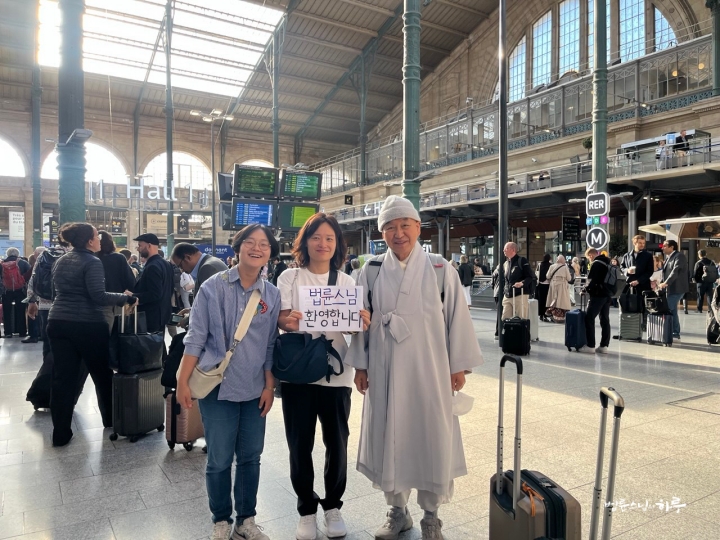
They immediately headed to the accommodation. Due to traffic, they arrived at 11 a.m. After lunch, Paris Jungto Society members who had prepared the lecture came to visit Sunim, offered three bows in greeting, and took a commemorative photo together.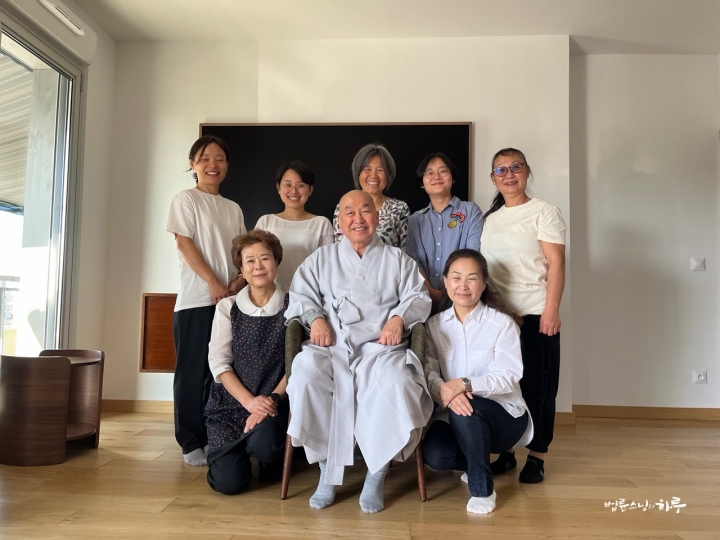
After a brief rest, they headed to the lecture venue.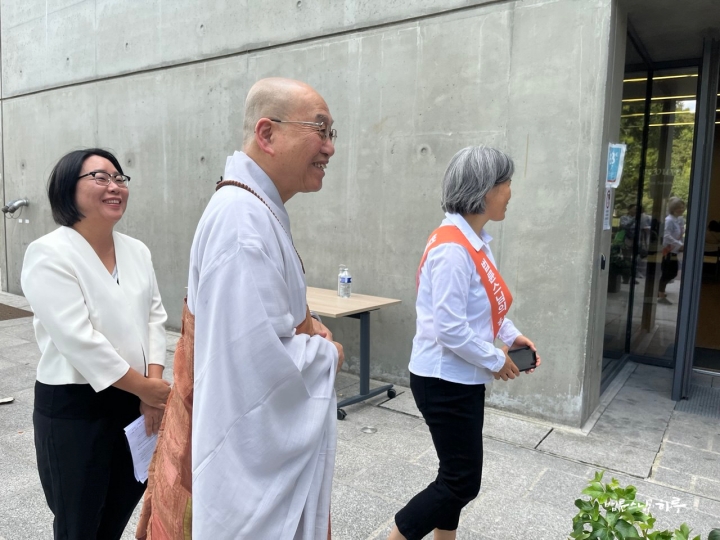
Today, two lectures were scheduled: one with French interpretation for local residents and a Dharma Q&A for Korean expatriates.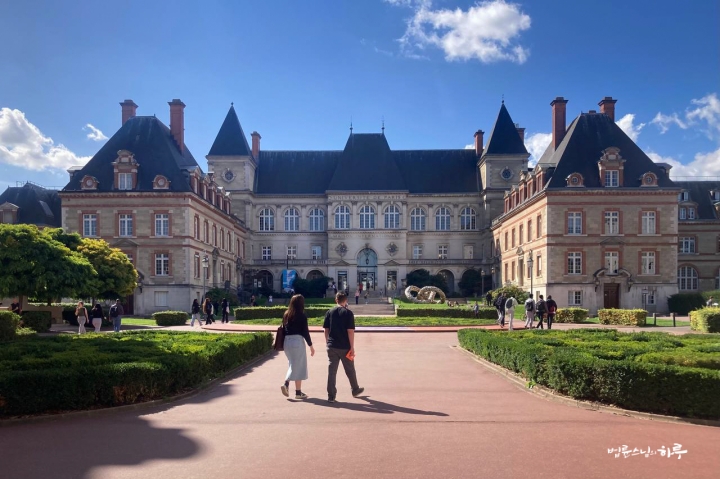
When Sunim arrived at the venue, the volunteers who had prepared the lecture warmly welcomed him. Today’s lecture was held at the Maison de la Corée (Korean House) within the Cité Internationale Universitaire de Paris (CIUP). Opened in 2018 as a symbol of academic and cultural exchange between Korea and France, it hosted Venerable Pomnyun Sunim’s Dharma Q&A today.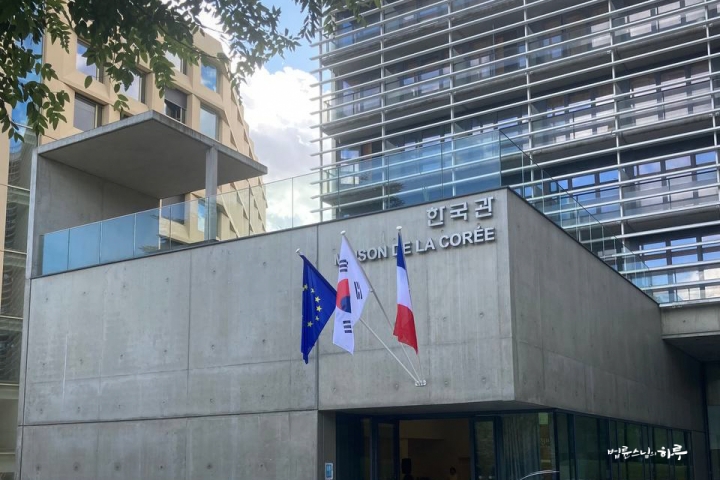
About 50 people attended after seeing various promotional materials, including 30 French nationals. This was the first lecture with French interpretation in Jungto Society’s history.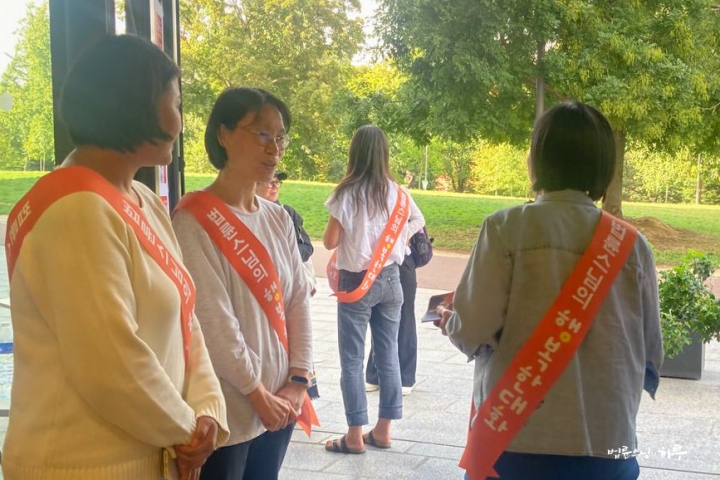
At 2:30 p.m., after watching an introductory video about Sunim, the lecture began. Ms. Baek Hye-ri provided French interpretation. First, Sunim gave opening remarks.

“Hello everyone, it’s nice to meet you. I think this is the first time I’m conducting a Dharma Q&A with French interpretation. (Laughter)
Dharma Q&A is a dialogue where we discuss various problems we encounter in life. We usually receive many congratulations when we get married, but we suffer when married life becomes difficult. We receive congratulations when we have a baby, but struggle with the difficulties of raising children. We rejoice and receive congratulations when we get a job, but find work life challenging. When we open a store, people congratulate us, but running the business proves difficult. Why is it that things we wished for and received congratulations for eventually bring suffering? Thinking about this raises questions and causes stress. Yet it’s not easy to ask someone about these things. Encyclopedias or Google searches can provide knowledge or technical information, but they don’t offer clear answers to life’s suffering. These days, people also ask artificial intelligence like ChatGPT or Gemini, but even there it’s difficult to find clear solutions to escape life’s suffering.
Why Do Even Celebrated Events Eventually Become Sources of Suffering?
In such times, we often share our troubles with friends over a cup of tea. The conversation we’re having here today follows the same approach. We can talk comfortably about life’s problems, just as if we were having tea with a friend. There are no restrictions on topics. Through such conversations, we might realize, ‘Oh, it’s not such a big deal,’ or ‘Oh, I can handle it this way.’ We’re not looking for specific answers, but rather allowing our anguish to disappear through dialogue. In Buddhism, this is called a ‘Dharma Talk.’ 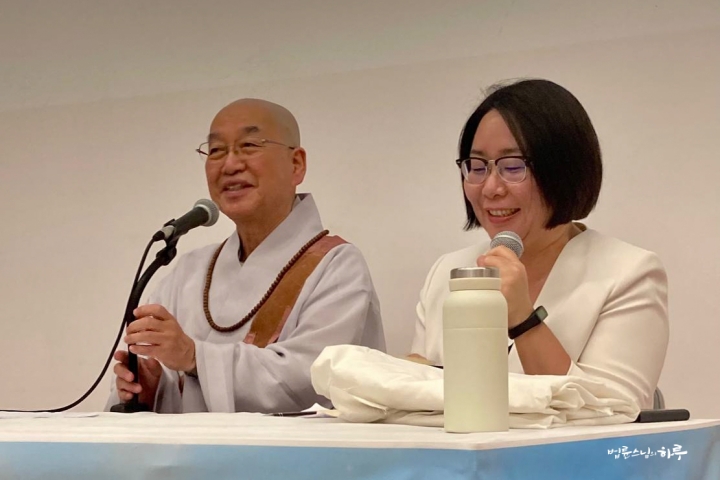
Even in Buddha’s time, many people had conversations with Buddha about their life problems. Through these dialogues, they could resolve their doubts and escape from suffering. The purpose was to attain a state free from suffering, namely Nirvana. Buddhist scriptures are collections of such conversations.
What we’re doing today is not simply repeating conversations that Indian people had 2,600 years ago. We’re here to discuss our current problems. I’ll first talk with those who have signed up for dialogue, and then continue conversations with those in the audience who raise their hands. Please speak comfortably, as if talking with a friend.” 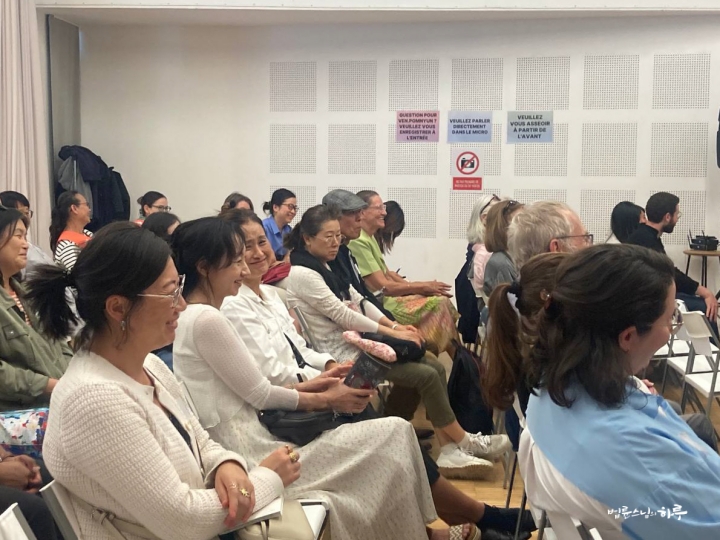
Anyone could raise their hand and ask Sunim questions. Over the course of two hours, seven people had conversations with Sunim. One of them sought Sunim’s advice about their mother who suffers from diabetes but refuses to follow treatment advice, causing her condition to worsen and their relationship to become distant.
My Mother Refused Treatment Advice, and Her Condition Got Worse
(I have concerns about my relationship with my mother. A few years ago, she was diagnosed with diabetes. As a pharmacist, I tried to help her by offering advice on lifestyle management and treatment methods several times. However, she refused to listen to me at all and continued to resist until her health became endangered. As this situation repeated, I became exhausted and naturally distanced myself. But as I reflect on myself, I now feel I want to restore our relationship in a better direction. I would like to hear your advice on how I can improve this relationship.)

“This problem arose because you ultimately tried to make your mother do things your way.”
“J’y ai pensé aussi.” (I thought so too.)
“If you can’t get your own children to do what you want, how can you expect expect your own mother to listen to you? You tried to do things your way, using the excuse that it was good for your mother’s illness. The fundamental cause of the deteriorated relationship is that ‘things didn’t go your way.’ Even between mother and child, it’s a relationship between two adults. You can make good suggestions, but you cannot make decisions for her. Your mother has her own right to decide, so you must respect that.”
“Merci beaucoup. Et du coup maintenant que la relation s’est un petit peu justement dégradée entre elle et moi, comment faire pour «revenir» à elle et ne plus essayer de la «manipuler» et juste revenir à elle pour retrouver une relation plus saine.”
(Thank you very much. But now that the relationship between my mother and me has become somewhat distant, how can I let go of trying to force changes or ‘manipulate’ her and just naturally become close again to restore a healthy relationship?)
“Right now it’s difficult because you have the obsession of ‘I must cure my mother’s illness.’ If you do what your mother wants, the relationship will improve quickly.”
“C’est assez difficile pour moi en tant que professionnel de santé de laisser quelqu’un objectivement dégrader sa santé et se mettre en danger.”
(As a health professional, it’s quite difficult for me to just watch someone objectively harm their health and put themselves in danger.)

“There is no such thing as objectivity. That too is just subjective. No matter how much I tell people here, ‘If you do this, your suffering will decrease,’ no one follows everything I say. But if I give up saying, ‘You’re not listening to me. Then there’s no need to talk,’ that’s also trying to have things my way. I merely make suggestions. Whether to do it or not is that person’s choice. I cannot force anyone. Even if someone listens to my story and thanks me for helping them, I don’t think ‘I did that.’ Because ultimately, it was that person’s choice. But if I think I did it, then I must also take responsibility for those who didn’t listen to me. Then instead of receiving gratitude, I would receive criticism. I simply do what I do, and the results are theirs.
We tend to give up when things don’t go our way, or turn away saying, ‘I don’t know anymore. Do whatever you want!’ Then the relationship deteriorates. But if you’re giving advice for your mother’s sake, just continue giving advice steadily. Acknowledge that ‘Whether she does it or not is her freedom,’ and continue giving advice. You don’t need to be stressed because she doesn’t follow it. Since you’re just making suggestions for your mother’s sake, it should be for her benefit in any case.
For example, if someone is experiencing financial difficulties and I try to give them 1,000 euros, but they don’t accept it, that’s good. I have no reason to hate them, right? If I resent them saying, ‘I’m giving this for your sake, how can you not accept my money?’ then I lose both money and the relationship. Just do your best, but recognize that accepting or not accepting is that person’s freedom. Then there’s no reason for the relationship to deteriorate.”
“Merci, j’ai bien compris.” (Thank you, I understand well.)
Questions continued one after another. For over two hours, the entire audience listened attentively and focused on Sunim’s words.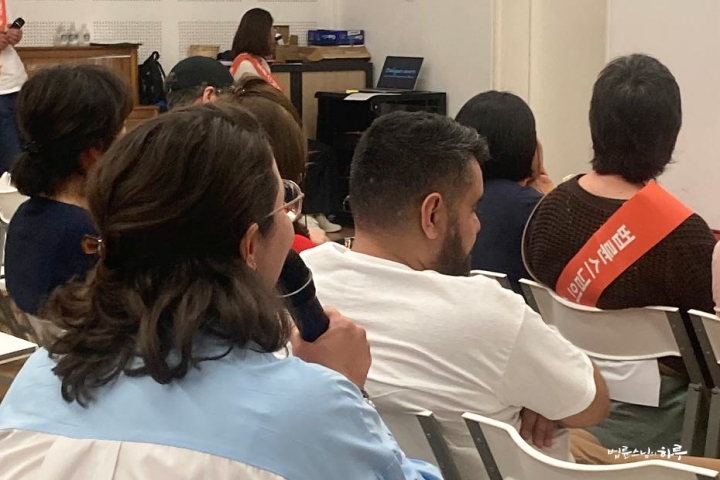
How can I recover after experiencing burnout? I worked for 4 years with too much work and no help at my job. Now I’m afraid to do other work.
I don’t want to live as an office worker, so I want to help people in difficulty by starting a personal business called ‘coaching,’ but I don’t know specifically how to do it.
In the process of encountering and learning Tibetan Buddhism, my faith is gradually disappearing and I feel deceived, but at the same time I feel guilty. How can I escape from this suffering?
What is the meaning of life? I question everything about why we live.
Why shouldn’t we suffer? Can’t we just accept suffering while living life?
I was betrayed by someone I trusted. How can I forgive him?
As the conversations continued, it was time to conclude. Though it was regrettable, the Dharma Q&A ended with hopes for future meetings.
After the lecture, there was a book signing session. Sunim warmly greeted the French attendees.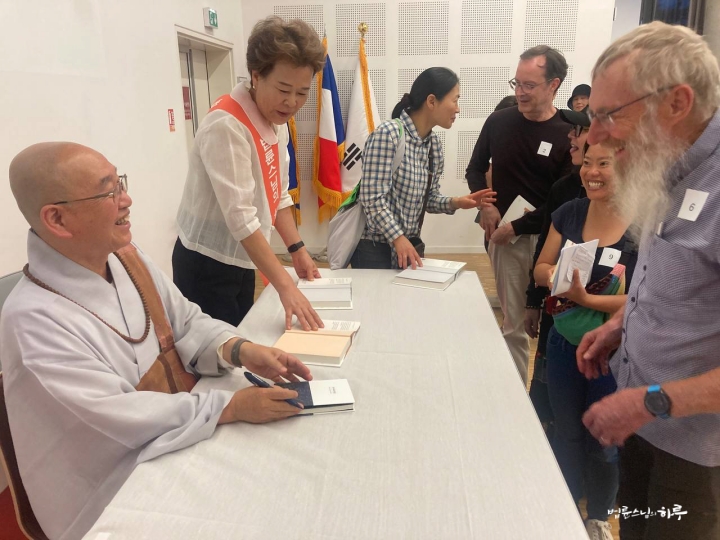
Soon after, four graduates of the English Jungto Dharma School and four new students of the French class, which opened for the first time this year, had time to introduce themselves to each other and earnestly shared their impressions from their studies.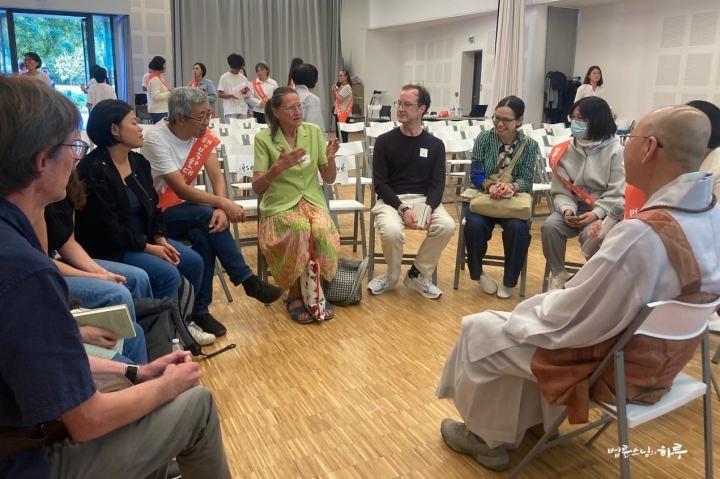
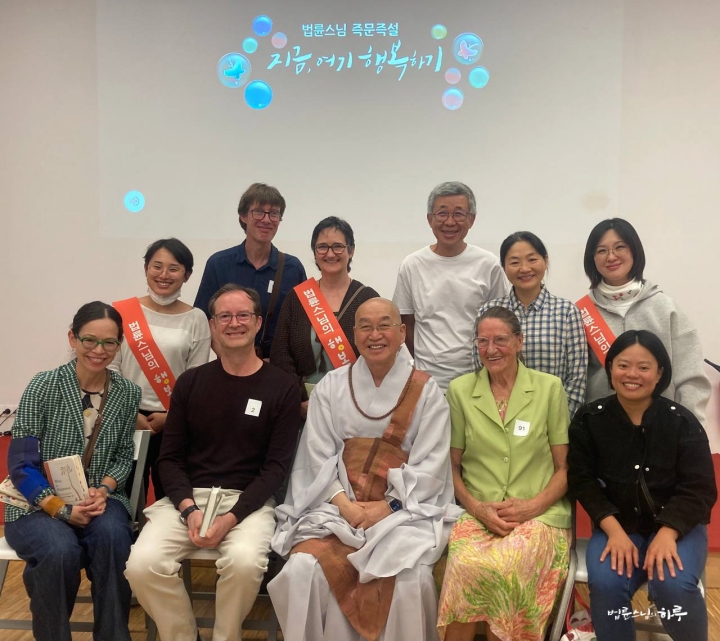
After taking a group photo together and pledging to continue their practice steadily, the gathering concluded.
After expressing gratitude to the International Division volunteers who prepared the French interpretation lecture, Sunim moved back to the accommodation for dinner.
After 6 PM, Sunim headed to the lecture hall again. In the evening, Korean expatriates living in France came to the lecture hall.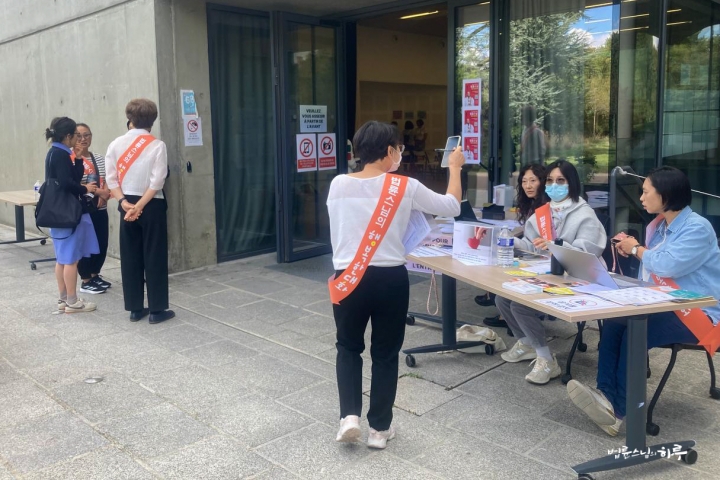
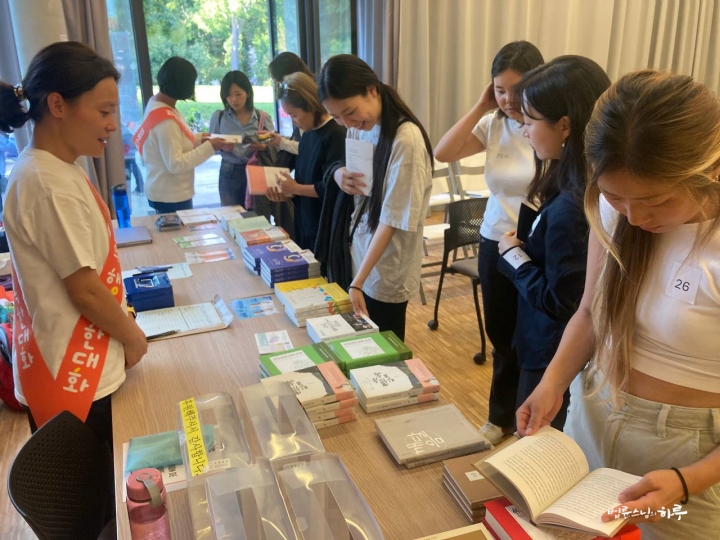
With about 110 people filling the venue, the lecture began at exactly 7 PM. When Sunim’s introduction video ended and he walked out from behind the stage, thunderous applause and cheers erupted.
Sunim smiled and gave his opening remarks.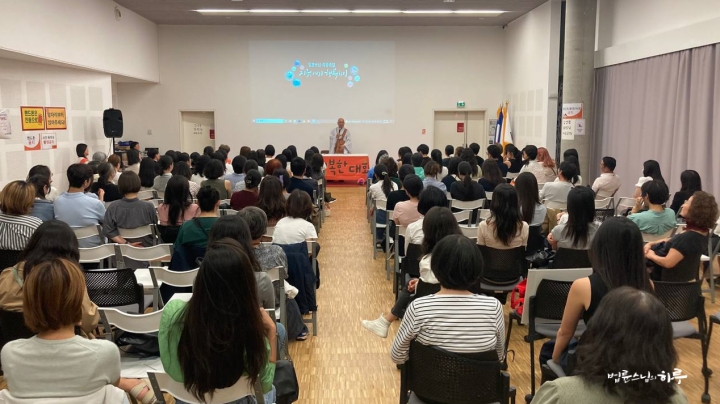
“Dharma Q&A is not a lecture format with a specific predetermined topic. It’s a place to freely discuss various problems we encounter in life. There are no restrictions on topics. You can bring up questions you have in mind, share current challenges or difficulties, or talk about stress.”
Anyone could raise their hand and ask Sunim questions. Over two hours, eight people had conversations with Sunim. One of them sought Sunim’s advice on how to overcome deep wounds and trauma from racial discrimination that cause emotional turmoil and suffering even from small incidents.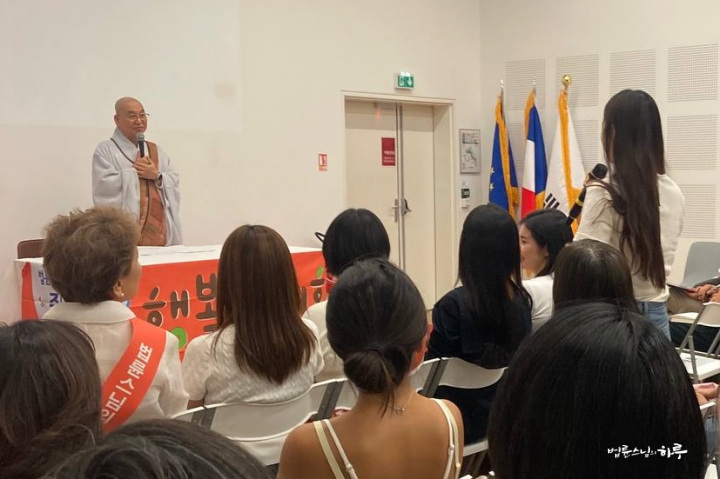
Tears Flow Even at Trivial Words, How Can I Overcome Trauma?

“If you react so sensitively to what people around you say like you do, it can be considered patient-level requiring treatment. It’s not simply having emotional wounds – when past wounds become major obstacles to your present and future life, healing is needed. First, when your nerves become tense and excitement surges, it would be good to receive medication treatment from a psychiatrist as a way to calm down. This is emergency treatment. However, in the long term, you need to find the root cause, identify what past experiences trigger sensitive reactions, and treat the emotional wounds. Have you been to a hospital?”
“Yes, I’ve talked with my doctor. They didn’t prescribe any medication separately, and each time I go, they just ask simple questions like a counselor and I answer.”
“For example, let’s say someone experienced sexual assault as a child. For some, that incident ends as simple pain, but for others, it remains as a wound and later even hearing related news makes them suffocate and recall the situation. This is a pathological reaction that requires healing. Sexual assault itself is a physical wound like cutting a finger, but when you receive tremendous mental shock, it becomes an emotional wound. The reason women often receive greater mental shock is related to prejudice about sexuality. It’s because they were educated from childhood in social prejudices that ‘women must protect their sexuality.’ That’s why sexual harm leaves deeper wounds. In such cases, if not healed, even married life becomes difficult. These are all cases requiring trauma treatment. But in your case, did you have experiences of receiving shock from racial discrimination as a child?”
“I experienced racial discrimination here.”
“Unless you received tremendously shocking experiences, experiences after becoming an adult usually don’t remain as such deep trauma. When young, even small things feel big and become wounds, but after becoming an adult, most things have less impact. To what degree were you shocked by racial discrimination here that it became trauma?”
“Rather than having tremendously big incidents, I live in a small town where there are almost no Asians. So even small things, when experienced repeatedly almost every week or month, the doctor said it might have accumulated.”

“Even so, I don’t think it would be enough to cause the symptoms you described. Perhaps it’s not the trauma itself but amplified by overlapping with other symptoms like depression. For example, when I’m having pleasant conversations with you all, everyone calls me ‘Sunim, Sunim.’ But if two people here, whether male or female, fight due to disagreement or conflict and develop hostility, would we maintain courtesy then? You can find out if you test it yourself. When emotions intensify through fighting, words like ‘How can a monk do this!’ naturally pop out. People use appearance or form – if someone is short, they say ‘You little guy!’ If someone has dark skin, they say ‘You with the pitch-black face!’ In other words, when faced with disadvantageous situations, they grab characteristics that usually aren’t apparent and insult the other person. When elementary students fight at school and are losing, if the other’s parents are from Vietnam or Thailand, they point out nationality, and if from North Korea, they say ‘North Korean!’ It’s the same in marital fights. When emotions intensify, people attack each other by pointing out racial, gender, or physical characteristics. When people get excited, they don’t hesitate to say deeply hurtful words to others. They curse the other’s parents, ancestors, even their ethnicity.
Cases like ‘You’re Korean so you can’t enter this restaurant’ or ‘You’re of a certain race so you can’t take the exam’ are clearly legal racial discrimination. Such cases are socially prohibited, and if you suffer disadvantage, you can sue and demand correction. But when people in the same neighborhood fight and emotions intensify, calling each other ‘little guy,’ ‘tall beanpole,’ ‘not even like a man, like a woman,’ or ‘monk’ – these have remaining cultural aspects and are difficult to punish legally. Because human emotions and cultural context are involved.
If an Asian lives in a white-only neighborhood, the whites might whisper among themselves. It’s the same as village ladies whispering ‘big-nose’ when a white person lives alone in a rural farming village. It becomes a wound for that person, but for them it’s everyday life. All humans become like this. Whether a foreigner lives in our neighborhood or I live in a foreign neighborhood, it’s the same.” 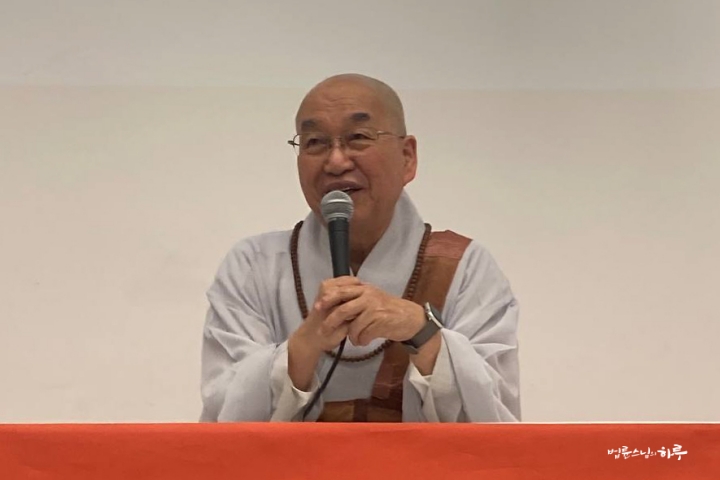
In cities like Seoul, most residents are Korean, but they’re all transplants. People from Gyeongsang Province, people from Jeolla Province—diverse groups live together, but everyone is too busy with their own lives to pay much attention to others. In contrast, rural communities are places where everyone knows everyone else’s business. When a foreigner moves into such a place, they need to be prepared for some degree of discrimination. Similarly, whether getting married, starting a job, or attending school—if you go to a school where everyone is white, you need to be prepared to face some discrimination. However, strictly speaking, this isn’t real discrimination. True discrimination is when you’re prevented from entering school or blocked from admission or taking exams—cases where clear disadvantages are imposed. Legal discrimination must be corrected immediately, while cultural discrimination requires patience and some degree of acceptance as it takes time to change.
Also, when abilities are similar, everyone tends to recommend people close to them. If a professor has four students—two French, one Chinese, and one Korean—and the professor is also French, who would they recommend when abilities are comparable? Naturally, they’d recommend the French students. It’s the same in Korea: people from Gyeongsang Province recommend people from Gyeongsang Province, and people from Jeolla Province recommend people from Jeolla Province. When abilities are similar, alumni tend to recommend each other. We can’t really take issue with this kind of discrimination. It’s human nature.
Experiencing some discrimination can actually help with personal development. To overcome discrimination, you need to build stronger capabilities. If you just complain, ‘Why them and not me?’ when abilities are equal, it’s difficult to survive abroad. You need to accept some degree of discrimination and overcome it by improving your abilities.
First, it’s necessary to receive trauma therapy. Second, you need to understand that cultural discrimination is a reality that must be accepted as a universal part of life.” 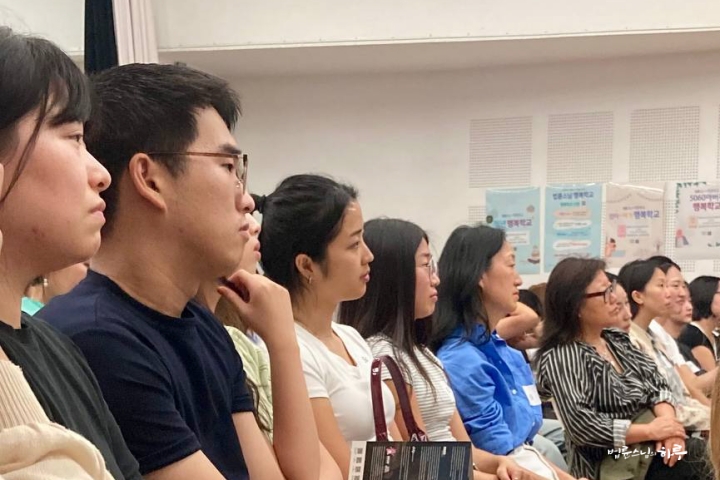
“But I often get startled because people suddenly yell at me or curse at me even when I’m just walking down the street.”
“Such things happen occasionally. Someone who dislikes Russians might curse at a Russian person they pass on the street, or someone who dislikes Chinese people might curse at an Asian person. There might be people who are mentally unstable. It’s natural to be startled when this happens, but if you react so severely that it makes you ill, it means you’re not prepared to live in that environment.”
“The most shocking incident happened at a bus ticket counter. When I didn’t give the answer they wanted, the person responded by yelling at me. I was very shocked, but I composed myself and asked the next day, ‘Why did you do that yesterday?’ The person said, ‘This is just how I am.'”
“You need some psychiatric treatment right now. Being this sensitive to such incidents means you’re not in a condition to live in this environment.”
“Would it be better for me to return to Korea?”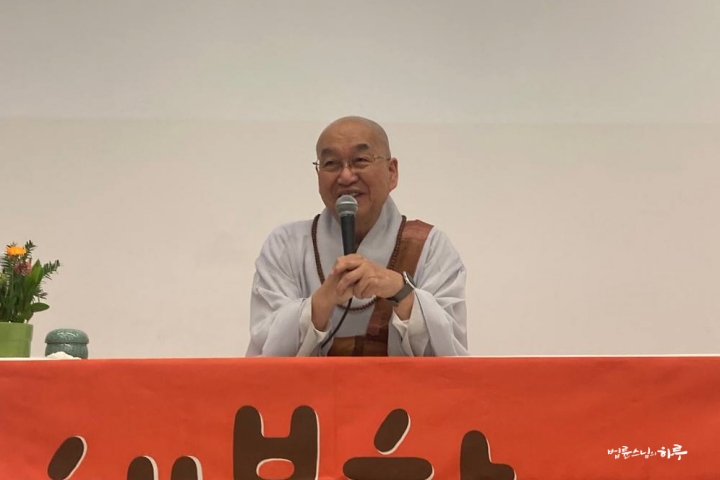
“Even if you return to Korea, you’ll have the same reaction when you encounter other problems. The key issue isn’t the environment but treatment. In your case, to be precise, it seems like depression symptoms are overlapping and amplifying what might be called trauma. I recommend getting hospital treatment, and if necessary, it’s fine to switch to a different hospital.”
“Thank you. I understand well.”
Questions continued one after another.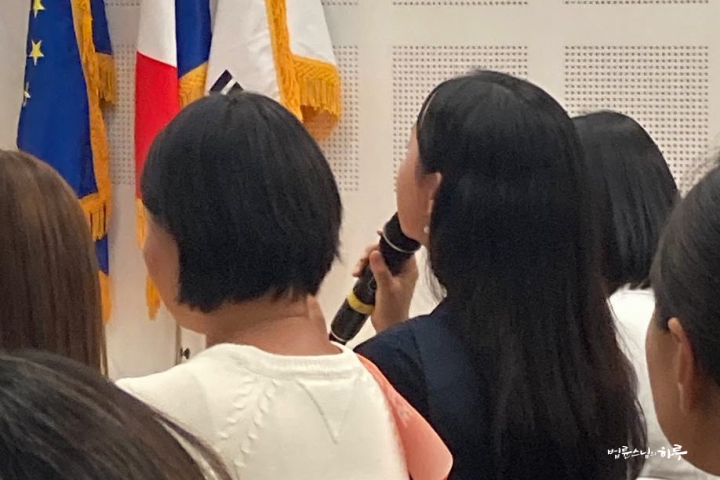
My husband and I have opposite personalities, and as stress builds up, I find myself getting angry over trivial matters. How can I reduce my anger?
I’m married and working abroad. How can I overcome the fear of possibly dying in a foreign land?
I’ve been in Paris for 8 years, and every time I visit my parents in Korea, I feel guilty seeing how they’ve aged.
I’ve been married to my French husband for 2 months. Everything is good, but our eating habits are so different that it’s difficult. How can I resolve this?
Is it hypocritical to say sorry even when I don’t feel sorry?
My boss with poor English pronunciation stresses me out so much when he curses that it makes me physically ill. How can I find peace of mind?
I’ve settled well in France and now want to help others, but sometimes people take it as lecturing. How should I help others?
After answering all the questions, Sunim offered words of encouragement to the Korean expatriates.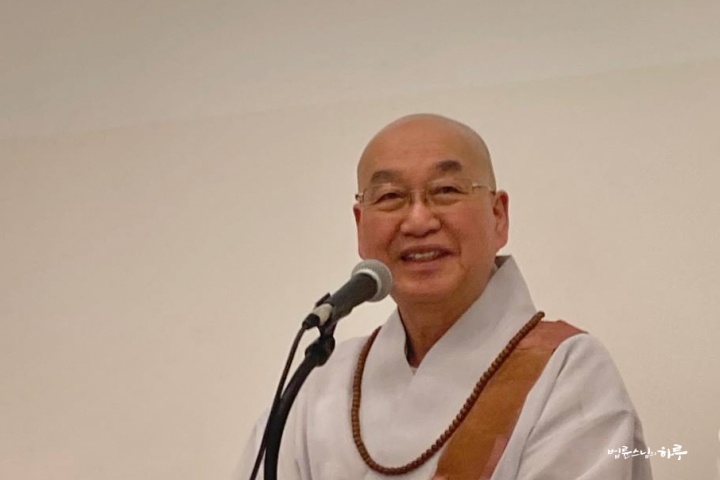
“When you came to France, did you come because France looked better than Korea, or did you deliberately come to a worse place?”
“We came because it looked better.”
“When I go to Afghanistan or Bhutan, I go to make bad places better. You all came to benefit from a good place. So don’t complain. If you have complaints, you can return to Korea. At worst, you’ll break even. When people marry, they hope for a better life, but if it doesn’t work out, they can divorce. Again, you break even. Some people worry about not being able to sell their building and ask me about it. It might be a big deal for them, but they’re still better off than those without buildings. You’re all actually doing fine.
I didn’t become a monk because I wanted to. I was forced into it by my teacher. But after doing it for a long time, it’s actually fine. I have no complaints. Yet you all chose your paths and now say you can’t live with them. There’s no point in complaining. Try as much as you can, and if it doesn’t work out, quit. Return to Korea or get divorced – make your choice. Just don’t decide too hastily. ‘Since I’ve started, let me try once more. If it doesn’t work out, I can quit.’ If you take this perspective, life isn’t such a big deal.”
The lecture ended with loud applause.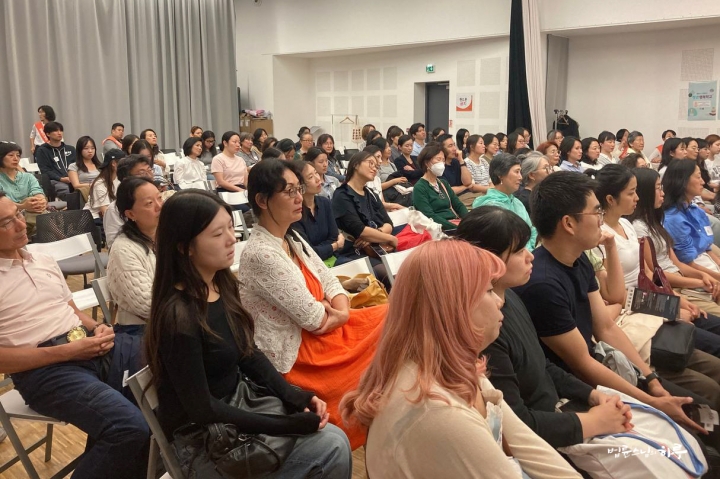
A book signing session began immediately. Most attendees lined up to receive Sunim’s signature. Sunim made eye contact and greeted each person.
“Sunim, please stay healthy.”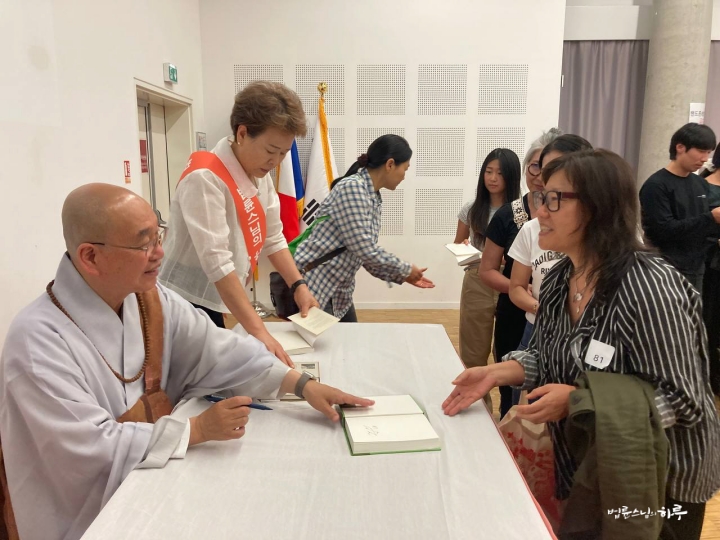
Most expressed their gratitude, saying their lives had become happier after listening to Sunim’s Dharma talks.
After all attendees left the venue, Sunim took a commemorative photo with the volunteers who had prepared the lecture.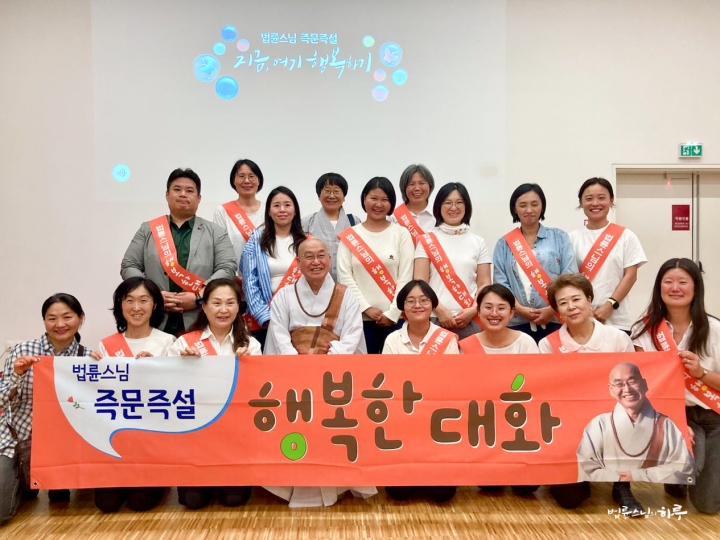
“Thank you all for your hard work.”
After expressing gratitude to the volunteers, Sunim moved to the accommodation. The volunteers had a mindful sharing session with Dharma Teacher Myodeok.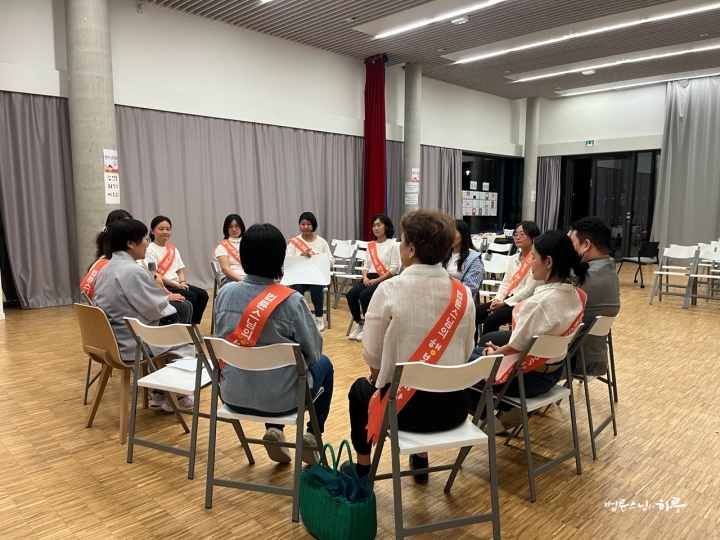
“While serving as the MC on the day of the lecture, I experienced great confusion, but seeing the people I had judged actually doing well made me reflect on my stubbornness.”
“I was happy to meet in person the fellow practitioners I had only seen online, and I’m grateful we could finish successfully together.”
“This time, instead of wanting to be praised, I approached it with the mindset of enjoying myself, and the volunteer work was much lighter and happier.”
After the lecture, the volunteers calmly continued cleaning up and were able to reflect on their time together.
Sunim arrived at the accommodation at 10 PM and concluded the day’s activities.
Tomorrow, Sunim will wake up at 2 AM to conduct a live broadcast of the Weekly Dharma Assembly for Jungto Society members in Korea, then immediately move to the train station to travel to Amsterdam for the third Dharma Q&A lecture of the European tour.






Je suis admiratif, je me sens mieux informée, je suis prête à poursuivre l’enseignement, sur Dharma…Au fil du temps je comprends mieux les principes. Je suis ravie de faire partie d’un groupe d’élevés, qui me “porte” et est enrichissant…
J’exprime une gratitude envers de Mètre P. Sounim et tous les benevolas et élèves.